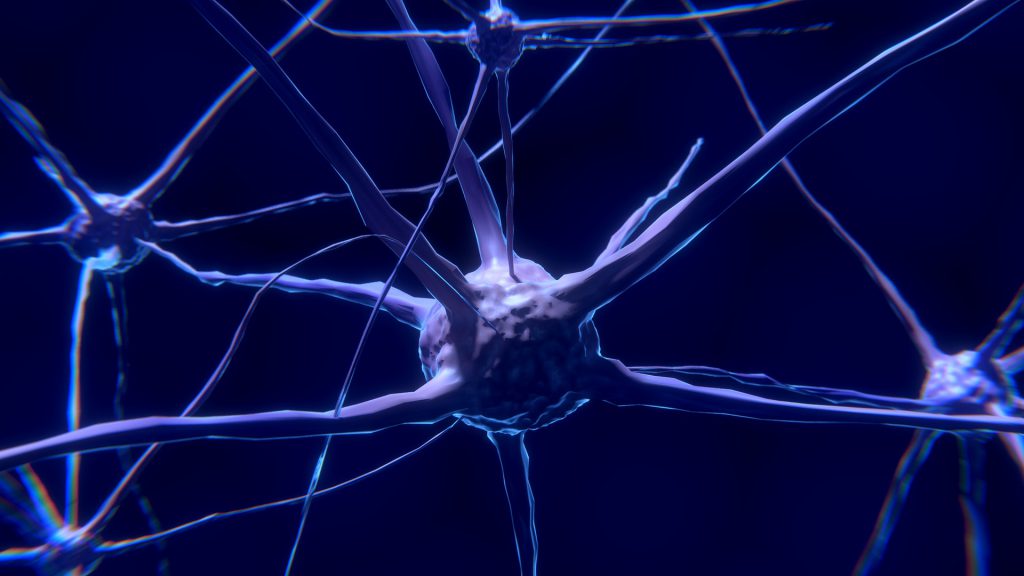What is MND
Find support
I have MND
I am supporting someone
Get involved
Research
About MND Scotland

MND is caused by the breakdown of motor neurons – the cells in the brain and spinal cord in charge of muscle control. These cells are connected together by synapses, which were the primary focus of the study.
It discovered that the loss of synapses is associated with a decline in cognitive brain function (thinking, planning, reasoning and emotions) which is seen in up to 50% of patients with Amyotrophic Lateral Sclerosis (ALS) – the most common type of MND.
The discovery was made with extremely powerful technology, used in MND for the first time, which allowed the scientists to view detailed images of synapses around 5000x smaller than the thickness of a sheet of paper.
The research was funded by the charity MND Scotland and led by the University of Edinburgh’s Dr Chris Henstridge, who believes the results could open up an entire new field of synapse-focused MND research.
He said, “In terms of my project, this is the first big aim I sought to address with the project grant I received from MND Scotland last year, so I’m very pleased to have achieved that, within around 12months.”
Dr Henstridge made the link after spending his time comparing data from people with MND who may have experienced some changes in their behaviour or ability to reason and make decisions. He then compared this data against those who have MND but who do not experience any of these changes, and against people who do not have the disease.
The study was possible thanks to the patients and staff from the Scottish MND Register, one of the first disease registries of its kind anywhere in the world. The register compiles accurate statistics of people with MND in Scotland and gives MND patients across Scotland the opportunity to donate their DNA for research purposes.
The discovery mirrors similar findings in Alzheimer’s disease, which have since inspired a new area of research into the role synapses play in cognitive change in neurodegenerative diseases.
Dr Henstridge said: “Up to 50% of ALS patients have some kind of change in brain function as well as motor problems. For a long time, researchers have tried to uncover the mechanism that might be driving this change in brain function, but have struggled. For the first time, we have discovered that a breakdown in connections between neurons in the brain is associated with a decline in brain function in ALS. Interestingly, synapse loss is a common feature of many neurodegenerative diseases in which a decline in brain function occurs, such as Alzheimer’s disease.”
“When synapse loss was first correlated with cognitive decline in Alzheimer’s disease, it kick started a huge field of synapse-focused research which has led to significant advancements in our understanding of the disease and even resulted in clinical trials of synapse-targeted therapeutics. My hope is that our new findings will initiate a similar wave of important research and ultimately lead to novel therapies for MND.”
Dr Henstridge began work along this line of research after MND Scotland awarded the project funding worth £213,400. The project is one of several across Scotland and the UK which is funded by the charity.
“MND Scotland have been amazing in giving me the funds to follow this line of research and I really look forward to trying to address the next important targets in my proposal. To achieve this, funding is always an issue but I am continually applying for other sources of funding to help boost the research.”
As of today, Dr Henstridge’s findings will be made available in the journal to researchers around the globe.
“Acta Neuropathologica is a very well respected journal in the field of neuropathology and it is very exciting that they will publish our study. I hope the work is well received by the research community and can inspire new avenues of MND research.”
Craig Stockton, MND Scotland’s Chief Executive, said: “These findings by Dr Henstridge and his team at the University of Edinburgh are very encouraging and I’m pleased to hear that the Acta Neuropathologica journal will be publishing his work.
“The findings highlight the importance of developing our understanding of how motor neurone disease affects the processes within the brain and how we might discover new avenues of research to help us fight back against MND.
“None of this would be possible without our passionate supporters, who have helped raise over £1.7 million, over the last 12 months, to allow us to continue funding research and providing care and support to families affected by MND.”
The research paper is open access and can be viewed here.
If you’re interested in helping MND research, by donating brain and spinal cord tissue, you can learn more here.
Sign up
for newsletter
Get the latest news and events straight to your inbox.
You can help create a world without MND